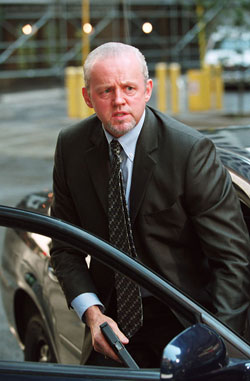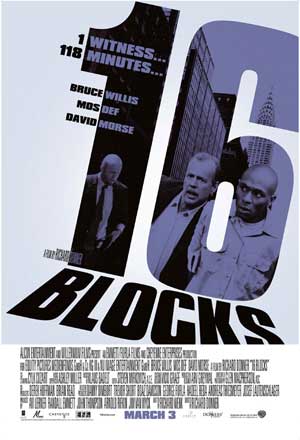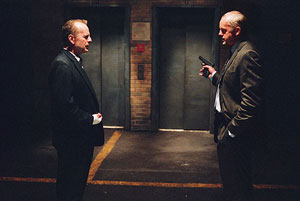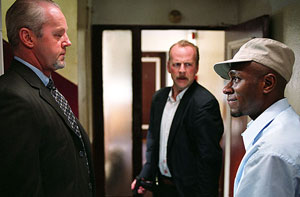 David Morse is one of those typical CHUD actors: we love him because of his long career of little roles in great films, where he’ll often have a memorable scene or two. He hit the big time – sort of – with his own short-lived TV show, Hack, but in general Morse isn’t one of those actors whose name is used to sell a movie.
David Morse is one of those typical CHUD actors: we love him because of his long career of little roles in great films, where he’ll often have a memorable scene or two. He hit the big time – sort of – with his own short-lived TV show, Hack, but in general Morse isn’t one of those actors whose name is used to sell a movie.
Which is what’s so cool about 16 Blocks. There Morse’s name is, right on the poster. And the guy deserves it – his role is the lynchpin of the film, the reason why Bruce Willis has such a hard time getting Mos Def just 16 New York City blocks in two hours. Yes, David Morse is playing a heavy. Try not to act so surprised.
In real life Morse is huge – hands that could palm two basketballs is what I’m talking about here. He’s quiet, soft spoken, but intense. He’s not without humor, but a dumb question at a roundtable like this one will earn you a stare that burns through your very soul.
Q: How is to be working with Richard Donner again?
Morse: It feels like one of the greatest presents of my life. He’s the man who started me off in films when I did Inside Moves twenty-five years ago. He took a chance on me when I’d never done a film in my life. Nobody knew who I was. And I starred in a movie and you know, I can’t even watch that movie now. It’s so painful for me. I feel like I didn’t hold up my end of things in it because I had to learn so much doing it. You know, so now, maybe I can come back and do something with him and I just hope I’m giving him something in return for what he gave me so long ago.
Q: Do you think that the two of you have changed that much since then?
Morse: I don’t think he has changed except for the better. I think he’s just better; he was a really good person then and he’s even become more of that good person. And as a director, you watch his films, he’s just really terrific. I don’t know if anyone could do a better version of this movie.
Q: You’ve played a lot of cops, and a lot of bad ones. How do you make them different?
Morse: Well, if the character isn’t different on the page, it’s hard for me to just kind of abstractly bring stuff into it. Sometimes I’ve done – not too many – but there’s just some that just feel like it’s a generic kind of bad guy. And I did one I don’t want to name, but we tried to bring a kind of more humor into it and I said I just wanted some way of doing it where we could just bring some humor to this guy and not make him so one dimensional. So they kind of added things on to the beginning and end of the scenes. And then when I saw the movie cut together they’d cut all that stuff out and all they had was the bad guy that I didn’t want to do.
Q: So then what was it about this particular character?  Morse: One because the script itself was clever. It really had some good turns in it. And you don’t always get that. A lot of times you’re way ahead of things that are going on or you feel like you’re seeing it over and over again. The thing that I really liked was the relationship with Bruce’s character. You know, these two guys who start out their day thinking the world is gonna be one way. They’ve been partners their whole lives, essentially on the same team and something happens and they’re on the other side of the fence now. And their lives are really, really at stake and I like that; I think that’s just a great situation.
Morse: One because the script itself was clever. It really had some good turns in it. And you don’t always get that. A lot of times you’re way ahead of things that are going on or you feel like you’re seeing it over and over again. The thing that I really liked was the relationship with Bruce’s character. You know, these two guys who start out their day thinking the world is gonna be one way. They’ve been partners their whole lives, essentially on the same team and something happens and they’re on the other side of the fence now. And their lives are really, really at stake and I like that; I think that’s just a great situation.
Q: How do you approach playing a bad cop? What’s the psychology behind it?
Morse: You know, when I was playing him, you tell yourself over and over again, you can’t go in and play a character thinking, ‘I’m playing a bad cop.’ They turn out to be fun to do but not because you’re playing a bad guy. You know, this is a guy who I think must be a really smart guy, and a guy who thinks of himself as kind of a caretaker. Takes care of everything, takes care of everybody. You know, for me, that’s what I’m thinking and doing. But you get to do some really bad things and those are fun.
Q: This guy rationalizes his own code of conduct. He really believes the end justifies the means.
Morse: He absolutely does. And that’s what he has to do is go out there and get the bad guys. And he’s willing to do the things that nobody else is willing to do. And I just don’t think he; he just doesn’t see the world the way the same way that we all see the world. And I think that’s what’s so interesting for us, and I think there’s kind of a fascination that people have with the criminal world. I certainly have it, I’m fascinated by it. I’m fascinated by the people who can go in and out of that world. And I think this is one of those guys that can go in and out of that world.
Q: How did Bruce Willis’s interpretation affect what you did?
Morse: I think what he did was – just as an actor – really courageous. To let himself be that character and not say – you never look at him and say ‘Oh, there’s the movie star, there’s the action hero, there’s the guy who’s showing us that he’s still Bruce Willis.’ I never felt that, I really felt that he was going for Jack Mosley and going for a guy who really hit bottom. And for me as an actor, I just love working with Bruce anyway. We did Twelve Monkeys together, we’ve known each other a while, so I was proud to be able to work with him. But just as an actor, to see where he was going with his character it makes everybody want to go new places with their character. If the guy at the center of it was doing it, let’s all do it.
Q: There are some people who think that we need cops like the one you play in this film, the ones who will get things done no matter the cost. What’s your take on that?
film, the ones who will get things done no matter the cost. What’s your take on that?
Morse: You know, I did the series Hack in Philadelphia and this is a very familiar story in some ways. There was a whole precinct that got involved with the same kind of stuff that’s in this movie, and a lot of cops in Philadelphia went down. I don’t want cops to be like that. I don’t think they need to. I think it’s tragic. It hurts them, it hurts their families. It’s a really tough job that we ask them to do and most of them do it great. I think it takes a toll on people to go and have to behave that way. I don’t want people to have that toll taken on them.
Q: What kind of character do you play in Down in the Valley? And what’s the status of that movie?
Morse: Apparently it’s being released in May. It was at Cannes. I saw it the LA film festival. That’s another one that, the guy who directed it had a really cool vision of life in the valley. He grew up in the San Fernando Valley. And he has a really cool story of Edward Norton, you know, he was the cowboy, there’s a whole twist on it. There were so many people doing so much good work on that film and it’s such a great kind of concept, I’m really glad its gonna finally come out and people will get to see it.
Q: What did it say about the San Fernando Valley?
Morse: Just that odd kind of world, where there used to be all the ranches, and it wasn’t that long ago but it was all orchards and ranches and you have this strange city life and this almost rural, desert kind of life that clash. And you really see it in the movie, where you can think that you’re out in the Wild West and you go over the hill and you’ve got developments as far as the eye can see. I don’t know what it says about it, but just that where the two worlds collide and that’s what happens in the movie.
Q: And you play a reasonably sympathetic character. You’re playing a father. Right?
Morse: Well you would think that I would be sympathetic. One of the things that’s fun about the movie is the twist it takes as you kind of see the father through the daughter’s eyes at first as the tough, non-understanding old man and then as it goes along Edward’s character starts to twist and mine you see the other way. I’m really just a dad struggling to bring his family up. So the story switches if you will; which is part of the fun of watching the movie.
Q: Some character actors don’t like that term…
Morse: Hopefully we’re all character actors. You know, in an ideal world.
Q: Some of them would love to be bigger stars, just so they don’t have to do as many films as they often have to do. What’s your opinion there?
Morse: I want to do as many films as I can that are good. I don’t care; I have to make money, we all have to make money. And I have to make choices to make money sometimes. But the reality of the world right now is there are fewer movies being made by studios and the choices are slimmer.
Q: In terms of good material you’re saying or in general?
Morse: Well just in general. I mean the material they’re doing, I mean you see it, everybody sees it. How do you get as many people in the world to go see that movie as possible? There’s a lot of compromises made in telling those stories. They’re still fun to do, you know, but they aren’t always as satisfying. I don’t know if I managed answering your question.
Q: That’s ok. Were you trying to be really selective in your choices or as much as possible?  Morse: I don’t know if I try to be. I think it’s my nature. I have a hard time doing things I don’t see something in. Not like I can just do it to do it.
Morse: I don’t know if I try to be. I think it’s my nature. I have a hard time doing things I don’t see something in. Not like I can just do it to do it.
Q: Can you talk about the experience of being nominated for the Golden Horse, the Hong Kong Oscar, for Double Vision? Was that a strange experience? Did you go to the ceremony?
Morse: I was doing a film at the time. I couldn’t go. I wish I could have gone. I think I was the first US actor ever nominated, which I consider a great honor. I loved being over there. I loved doing that film over there. I loved being in Taiwan. I felt really at home there in a lot of ways. So, to be recognized, you know. The thing that made me feel bad about it is that I thought, really the work other people did in the movie was a lot better than what I was doing. I was sorry that they weren’t recognized.
Q: What’s the experience of working on a set where everybody’s speaking a different language?
Morse: Well for me it was great because the character I was playing didn’t understand a word anyone was saying. I didn’t have to do a lot of acting for that.
Q: Do you have an ideal role that you haven’t played yet that you’re looking forward to play?
Morse: Somebody just asked me about that. I haven’t had the ability to Shakespeare, and I know you’re all hardly going to want to run out and see some Shakespeare, but I actually would like to you know, have a shot at that.
Q: Of course you read Shakespeare now and then?
Morse: I do, I’ve seen a lot and I still have monologues that I’ve learned and I walk around the house doing my Shakespeare monologues. Doing the dishes.
Q: How important is going back to theater occasionally for you?
Morse: It’s extremely important and I rarely get to do it. It’s been since How I Learned to Drive, and that was nine years ago. It takes such a toll on my family, its very hard for me to say yes, I’ll go away for six months, and do something just because I want to do it.
Q: How much of a toll did that play take out of you?
Morse: It did not take a toll at all. Because of playing a pedophile?
Q: Yeah.
Morse: I actually was asked to do another movie, which was a really good movie and play a pedophile in it, and I turned it down just before that. Because he was a pedophile that – he was so clearly bad, and there was no understanding about that character, he was just a bad guy and I didn’t know if I could live with that. In How I Learned to Drive, the woman that wrote it, Paula Vogel, had – and this may sound really strange – but she had such an affection for the character, she really had an insight into that character that we don’t always get to see. And because of what she saw in that character it made it easy for me to live with doing that character.
Q: Earlier you had talked about playing a character that you wanted to inject humor in and then they cut it and made him one dimensional? Yesterday we talked to Kathy Bates, and she said sort of when you make a movie it’s a crap shoot. Like you don’t know how it’s going to turn out. Somebody who works as much as you do, how do you deal with when you’re doing the film and you feel good about it and then you see it and they’ve edited it to hell? How do you deal with that?
Morse: Well, there’s the behavior you would see when I’m in my house alone and then what I present.
Q: What do you do at home alone?
Morse: Well, my wife can’t be in the room, I can tell you that.
She can barely be in the room. It’s upsetting, I will tell you. You know, I’ve seen things where literally they would take a scene I was doing and it was supposed to be in the beginning of the movie and they put it later completely out of context, and as an actor, well, it’s distressing, obviously. You don’t know why you’re doing what you’re doing. I’ve worked hard as an actor, I have ideas, I care about this movie, I’m giving you everything I can give, and then you use it like that. It’s as I say, distressing.
Q: How satisfied are you on this one?
Morse: You know, on that I’m really pleased. I don’t say that very often. I’m just pleased with everybody’s work and I’m actually ok with myself, which is a rare event.